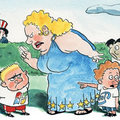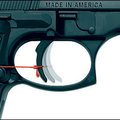| |
 | |
Wounded, tetchy and less effective than it should be, America is still the power that counts
EVEN the greatest empires hurt when they lose wars. It is not surprising then that Iraq weighs so heavily on the American psyche. Most Americans want to get out as soon as possible, surge or no surge; many more wish they had never invaded the country in the first place. But for a growing number of Americans the superpower's inability to impose its will on Mesopotamia is symptomatic of a deeper malaise.
Nearly six years after September 11th, nervousness about the state of America's “hard power” is growing (see article). Iraq and Afghanistan (another far-off place where the United States, short of troops and allies, may be losing a war) have stretched the Pentagon's resources. An army designed to have 17 brigades on active deployment now has 25 in the field. Despite bringing in reservists and the National Guard, many American troops spend more than half their time on active duty; the British spend a fifth.
Other demons are jangling America's nerves. There is the emergence of China as a rival embryonic superpower, with an economy that may soon be bigger than America's (at least in terms of purchasing power); the re-emergence of a bellicose, gas-fired Russia; North Korea's defiance of Uncle Sam by going nuclear, and Iran's determination to follow suit; Europe's lack of enthusiasm for George Bush's war on terror; the Arabs' dismissal of his democratisation project; the Chávez-led resistance to Yankee capitalism in America's backyard.
Nor is it just a matter of geopolitics. American bankers are worried that other financial centres are gaining at Wall Street's expense. Nativists fret about America's inability to secure its own borders. As for soft power, Abu Ghraib, Guantánamo Bay, America's slowness to tackle climate change and its neglect of the Palestinians have all, rightly or wrongly, cost it dearly. Polls show that ever fewer foreigners trust America, and some even find China's totalitarians less dangerous.
A sense of waning power is not just bad for the self-esteem of Americans. It is already having dangerous consequences. Inside the United States, “China-bashing” has become a defensive strategy for both the left and the right. Isolationism is also on the rise. Most Democrats already favour an America that “minds its own business”.
Outside America, the consequences could be even graver. Iran's Islamic revolutionaries and Russia's Vladimir Putin have both bet in different ways that a bruised Uncle Sam will not be able to constrain them. Meanwhile, a vicious circle of no confidence threatens the Western alliance: if Italy, for instance, concludes that a weakened America will not last the course in Afghanistan, then it will commit even fewer troops to the already undermanned NATO force there—which in turn prompts more Americans to question the project.
Yet America is being underestimated. Friends and enemies have mistaken the short-term failure of the Bush administration for deeper weakness. Neither American hard nor soft power is fading. Rather, they are not being used as well as they could be. The opportunity is greater than the threat.
It is hard to deny that America looks weaker than it did in 2000. But is that really due to a tectonic shift or to the errors of a single administration? Dick Cheney and Donald Rumsfeld reversed the wise Rooseveltian doctrine, “Speak softly and carry a big stick”. After September 11th the White House talked up American power to an extraordinary degree. In that brief period of “shock and awe” when Americans were from Mars, their Venutian allies were lucky to get invited to the show (indeed, in Afghanistan some “old” Europeans were initially turned away). Meanwhile, Mr Bush declared a “war on terror”, rather than just on al-Qaeda, broadening the front to unmanageable dimensions (and paving the way for Guantánamo).
While the talk was loud, the stick was spindly. Defying his generals, Mr Rumsfeld sent too few troops to Iraq to pacify the country. Disbanding the Iraqi army compounded the error. Regardless of whether Iraq was ever winnable, it is hard to imagine any future American administrations making such schoolboy howlers when it comes to regime change.
Yet in one way Mr Bush is unfairly maligned. Contrary to the Democratic version of history, America did not enjoy untrammelled influence abroad before he arrived. The country that won the cold war also endured several grievous reverses, notably Vietnam (where 58,000 Americans were killed—16 times the figure for Iraq). Iran has been defying America since Jimmy Carter's presidency, and North Korea for a generation before that. As for soft power, France has been complaining about Coca-Cola and Hollywood for nearly a century.
From this perspective of relative rather than absolute supremacy, a superpower's strength lies as much in what it can prevent from happening as in what it can achieve. Even today, America's “negative power” is considerable. Very little of any note can happen without at least its acquiescence. Iran and North Korea can defy the Great Satan, but only America can offer the recognition the proliferating regimes crave. In all sorts of areas—be it the fight against global warming or the quest for an Arab-Israeli peace—America is quite simply indispensable.
That is because America still has the most hard power. Its volunteer army is indeed stretched: it could not fight another small war of choice. But it can still muster 1.5m people under arms and a defence budget almost as big as the whole of the rest of the world's. And it could call on so much more: in relation to the country's size, its defence budget and army are quite small by historical standards. Better diplomacy would enhance its power. One irony of the “war on terror” is that Mr Bush's hyperventilation worked against him in terms of getting boots on the ground: neither his own countrymen nor his allies were sure enough that they were really under threat. (And why should they be? An American-led West spent four decades tussling with a nuclear-armed empire that stretched from Berlin to Vladivostok; al-Qaeda is still small beer.)
The surveys that show America's soft power to be less respected than it used to be also show the continuing universal appeal of its values—especially freedom and openness. Even the immigrants and foreign goods that so worry some Americans are tributes to that appeal (by contrast, the last empire to build a wall on its border, the Soviet one, was trying to keep its subjects in). Nor is it an accident that anti-Americanism has fed off those instances, such as Guantánamo Bay, where America has seemed most un-American. This is the multiplier effect that Mr Bush missed: win the battle for hearts and minds and you do not need as much hard power to get your way.
That lesson is worth bearing in mind when it comes to the challenge of China. China is likely to be more and more in America's face, whether buying American firms, winning Olympic gold or blasting missiles into space. Merely by growing, China is disrupting the politics of the Pacific. But that does not mean that it is automatically on track to overtake America. Its politics are fragile (see article) and America's lead is immense. Moreover, economics is not a zero-sum game: so far, a bigger China has helped to enrich America. An America that stays open to China—an America that sticks to American values—is much more likely to help fashion the China it wants.
If America were a stock, it would be a “buy”: an undervalued market leader, in need of new management. But that points to its last great strength. More than any rival, America corrects itself. Under pressure from voters, Mr Bush has already rediscovered some of the charms of multilateralism; he is talking about climate change; a Middle East peace initiative is possible. Next year's presidential election offers a chance for renewal. Such corrections are not automatic: something (a misadventure in Iran?) may yet compound the misery of Iraq in the same way Watergate followed Vietnam. But America recovered from the 1970s. It will bounce back stronger again.






